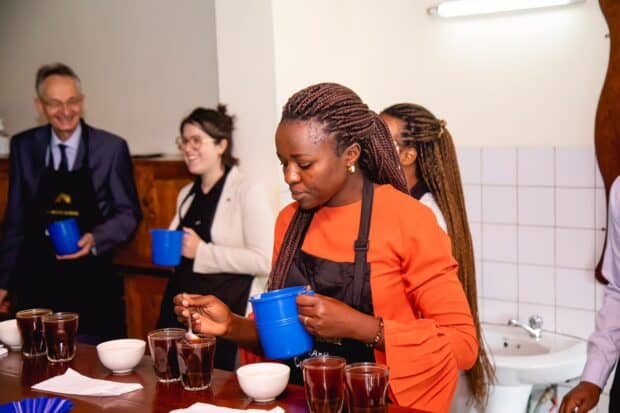Laetitia Mukandahiro, co-founder of Ikawa House in Kigali, Rwanda. All images courtesy of Laetitia Mukandahiro.
In a sunny yellow room with a large coffee taster’s flavor wheel on one wall and a branded jute bag on the opposite wall, Laetitia Mukandahiro and Uzziel Habimana of the coffee education and export company Ikawa House prepare for their morning cupping session in Kigali, Rwanda.
Laetitia positions the coffees from Rwanda, Ethiopia, El Salvador, Guatemala and Colombia around the table, while Uzziel places numbers next to each station for the blind tasting. The two Ikawa House co-founders move seamlessly around the table with a fluidity that comes from years of working together and countless hours of cuppings.
Eventually, a group of students arrives. These budding coffee professionals move more cautiously around the table, tasting, writing down their notes and scoring each coffee.
Laetitia facilitates a discussion about each sample, using a dry-erase board to record the scores. The students look around in amazement when Laetitia and Uzziel share their scores, not once varying on any of the coffees by more than 0.25 points.
Fortuitously Finding a Calling
Years ago, after graduating high school, Laetitia wanted to earn a little money, so she joined the Dukundekawa Musasa Coffee Cooperative where her father worked in Rwanda’s Northern Province.
The start of her work coincided with the early days of the Partnership for Enhancing Agriculture in Rwanda through Linkages (PEARL) project, a USAID-funded project designed to boost the Rwandan specialty coffee sector following the civil conflict.
Laetetia sorted coffees on the drying tables for one day before representatives of the PEARL project came looking for people interested in learning about cupping. Over the next six months, she trained with cupping experts from all over the world. She was, to her knowledge, the first woman to become a professional cupper in Rwanda.
“I learned this is where I should be,” Laetetia recently told DCN. “This is my work.”
After her training, Laetetia was recruited by Rwandan coffee company RWASHOSCCO to be their head cupper. After six more years, she went on to work in quality control at KZNoir and Buff Coffee Company, respectively.
In 2019, Laetitia and Uzziel, who each had 18 separate years of coffee experience, decided to join forces and start Ikawa House, an export and value chain development company.
Building Ikawa House
At Ikawa House, Laetitia and Uzziel are committed to continuing to elevate Rwandan coffee by working with farmers, cupping every coffee they can and educating others.
Said Laetecia, “Ikawa House selects their partner coffee washing stations based on their commitment to fair business practices, quality consistency, history, and infrastructure.”
In a day’s time, Laetitia and Uzziel might cup around 200 samples. In a coffee season, that translates into something like 7,000-10,000 samples. In addition to scoring the coffee and ensuring quality, Laetitia works to identify ideal markets for the green coffee, noting which coffees might appeal to United States buyers, and which might appeal to Japanese buyers, for example.
Laetitia said she and Uzziel maintain the belief that by training others and sharing what they know, they can positively influence the quality of coffee throughout the entire country — and that is their primary goal.
Here’s more from DCN’s conversation with Laetitia Mukandahiro…
Three Questions with Laetitia Mukandahiro
What about coffee excites you?
I like how coffee connects people. I like to see how the producers connect with consumers, and I like to play that role, to connect producers with consumers.
I like assisting farmers. Sometimes they come here and say, “Thank you for the advice you gave me. Seven years ago, I was able to sell one container, but after you assisted me, I was able to triple my salary.” I like to send coffee to the clients and have them say, “Wow, it was beyond what I was thinking.”
When the producer is happy, and the client is happy — also me.
What about coffee troubles you?
The prices change a lot and the instability of the market is very challenging. The producers are always wondering. One year they can get a good price, and the next year they can only get half the price.
I wish that people knew how hard farmers work. Sometimes we tell them the price, and they say it is too high, but they don’t know the hard work of the farmer. They need to pay school fees [for their kids]; they need to pay back the bank; they need to take care of the families; and many times the price is not responding to their work. I would like to see the farmers get the kind of support that can change [their] life.
What would you be doing if it weren’t for coffee?
If I did another thing… (long pause), I would be a teacher.
Jen Roberts Jen Roberts is a Paris, France-based writer and avid coffee drinker. She’s currently writing a book on women in coffee.


